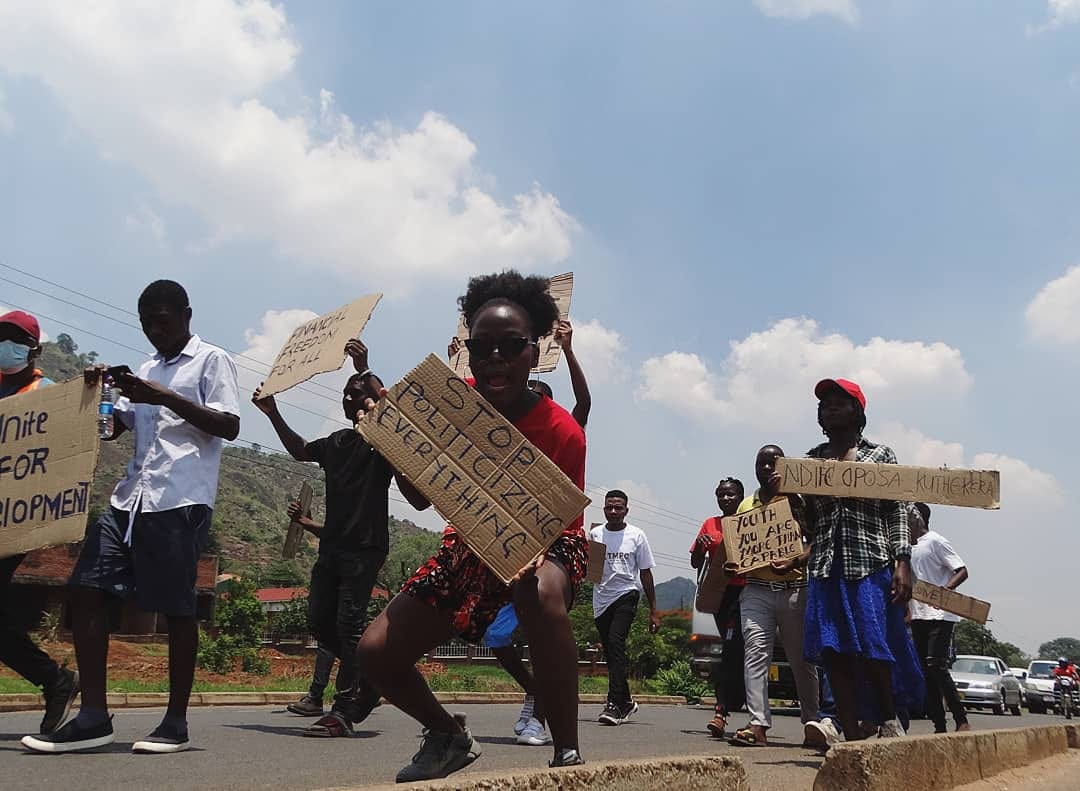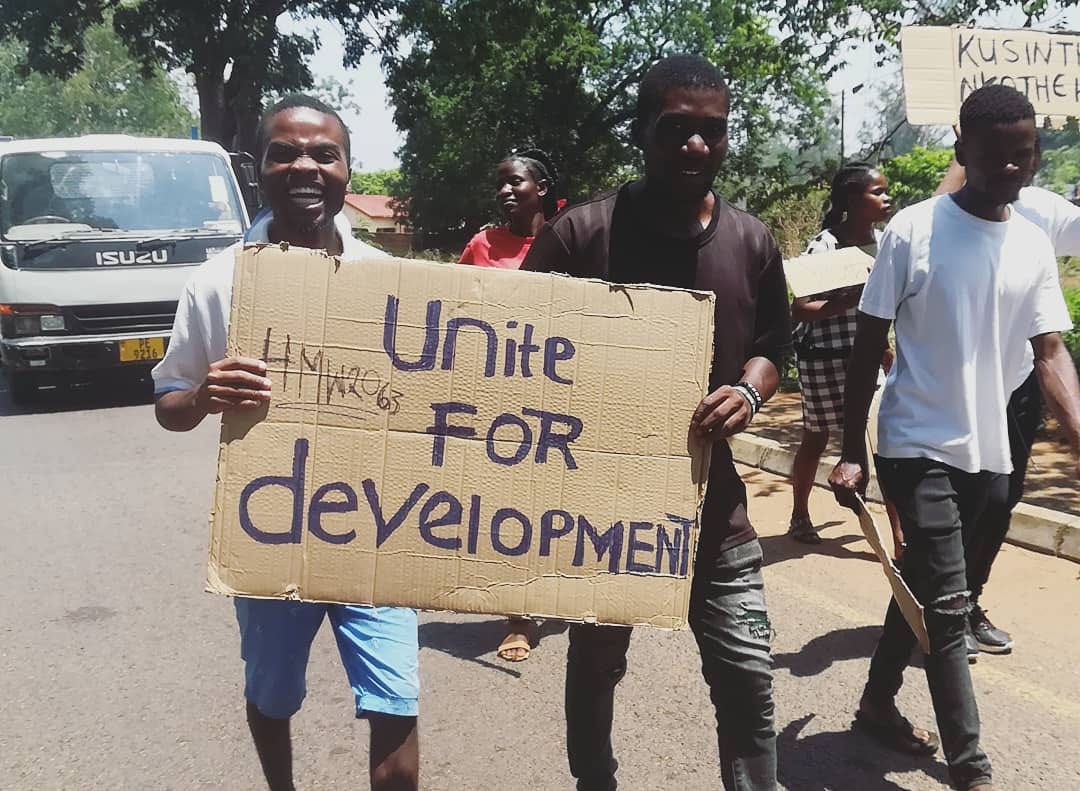Youth rise up in action towards Malawi2063
Malawi's youth, who account for one-quarter of the country's population, with approximately 51% of them under the age of 18 as of 2018, face numerous challenges.
Malawi: In Zomba, there is an air of optimism and positivity around the Matawale stage. A noticeable number of youth representatives from various universities and organisations are seen banding together for a common cause. It is eleven o'clock in the morning.
The scorching sun can be seen clearly through the thin air, which is now thick with heat. The young men and women gather to begin their positive walk, a peaceful call to action for Malawi2063.
They will stop at nothing to complete their mission for the day, Placards held high and courage on their shoulders. They're setting out on foot, each step worthy of their convictions. They march in unison, unaffected by the sweltering heat, into Zomba town to present their vision.
They will undoubtedly remember the day they bravely paraded into Malawi's former capital city, waving not only their placards but also their pride at being a part of a positive initiative aimed at driving mindset change and a brave call to action.
This youth-led positive parade, aimed at demonstrating a positive mindset toward Malawi2063, is one of many youth-led initiatives worth applauding in the country.
The positive walk initiative is led by Chaka Ritchie Phiri, the founder/CEO of Inspiring Positive Innovations - IPI, a multi-model entity focused on empowering economic sustainable development.
According to him, one of Malawi's most pressing challenges is the primitive mindset of its youth.
He sees this as a major contributor to the lack of development and rapidly rising levels of poverty and unemployment.
“We are here to tell fellow youths that change is possible, we can drive it and we will drive it,” he says.
He emphasises that the march is not political and that their agendas are patriotic and that they are there to inspire more young people to share a similar vision that will drive them to take the necessary actions toward development.
“The first solution that we have already started implementing is the design thinking framework –FIDS (Feel, imagine, do and share) for KIDS that we have implemented in 11 government primary schools from Blantyre and Zomba where we have engaged approximately 9,400 learners in the ministry of education,” says Phiri.
He goes on to say that the second solution is to launch awareness campaigns to educate and empower youths by bridging the gap between emotions (innovation) and intellect (capacity) in the direction of the youth-centric Malawi2063.
He says: "We are looking forward to engaging stakeholders from the private sector like TNM, FCB, CASTEL and ILOVO as well as the ministries responsible for youth, gender and education, to see how best they can assist in implementing these solutions which will lay out a necessary foundation for youth-centric visions like these."
As the walk from Matawale to Zomba town progresses, the placards held by this group of young optimists appear to be attracting the attention of Zomba citizens, as various people are seen pulling out their cellphones to capture the moments.
Among the messages on the placards are those about how change is possible, the importance of unity in development, and how every citizen is deserving of financial freedom.
Bran Banda, a third-year student at the University of Malawi's Chancellor College (CHANCO) in Zomba, is enthusiastic about the cause.
He expresses his delight at the gathering of young people to express their concerns and to remind Malawians that a better Malawi is possible.
“I am honestly just so fulfilled with what we all came together to do today. So many of us are sleeping on our dreams waiting on someone to make them happen for us, but there is really no one more responsible for the fulfilment of our dreams than ourselves,” says Banda.
“We are here, we are present and we are more than excited for a future that is ready to accommodate youth-driven dreams.”
Banda also expresses concern about the high rate of dependency among Malawi's youth. He believes that young people should stop relying solely on the government and others for employment.
"Young people need to tap into their creativity and start building sustainable businesses of their own where they can also employ others. With this mindset, we can even surpass the 1 million jobs that were promised by the current government,” he says.
Malawi's youth, who account for one-quarter of the country's population, with approximately 51% of them under the age of 18 as of 2018, face numerous challenges. One of the most significant challenges that young people face is the high rate of unemployment.
Sitabene Majamanda, the founder of The Mentorship and Philanthropic Center (TMPC), says she was inspired by the youth who took the initiative to spread positivity during a time of social and economic turmoil during her remarks on the youth-led positive walk that took place in Zomba.
"Globally, the world is facing many challenges. Therefore, echoing and calling out for positivity and innovative thinking to ride above these challenges is the way to go. Innovation and solution finding is very fundamental considering the times we are living in right now,” says Majamanda.
"The threats posed by the current global social and economic challenges can easily lead young people into panic, distress and depression. We should, therefore, be mindful to embrace the voices of positivity, creativity and innovation if we are going to conquer the challenges that are upon us."
As the year comes to a close, with many countries, including Malawi, honouring the 16 days of activism against gender-based violence and awakening to the reality of other brutal pandemics around the world, may we also be reminded that youth are an essential asset for the future.
Malawi2063 is a plan to achieve self-sufficiency and financial independence in Malawi.
The vision is based on the belief that the above-mentioned goals are attainable through collaborative efforts and solidarity.







